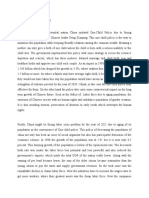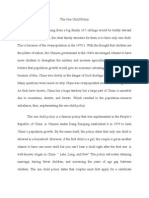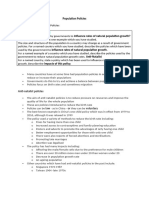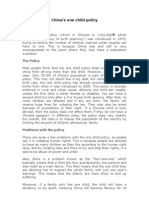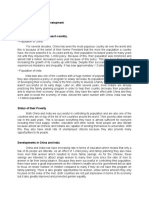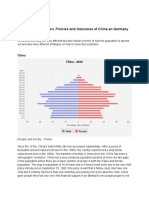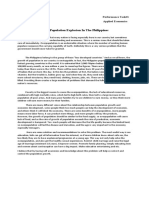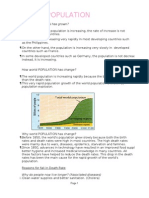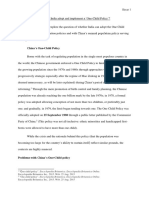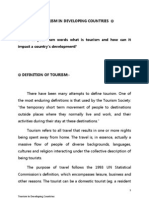0 ratings0% found this document useful (0 votes)
319 viewsGeography Essay
Geography Essay
Uploaded by
api-266614272Copyright:
© All Rights Reserved
Available Formats
Download as DOCX, PDF, TXT or read online from Scribd
Geography Essay
Geography Essay
Uploaded by
api-2666142720 ratings0% found this document useful (0 votes)
319 views3 pagesOriginal Title
geography essay
Copyright
© © All Rights Reserved
Available Formats
DOCX, PDF, TXT or read online from Scribd
Share this document
Did you find this document useful?
Is this content inappropriate?
Copyright:
© All Rights Reserved
Available Formats
Download as DOCX, PDF, TXT or read online from Scribd
Download as docx, pdf, or txt
0 ratings0% found this document useful (0 votes)
319 views3 pagesGeography Essay
Geography Essay
Uploaded by
api-266614272Copyright:
© All Rights Reserved
Available Formats
Download as DOCX, PDF, TXT or read online from Scribd
Download as docx, pdf, or txt
You are on page 1of 3
Geography essay
Responses to population issues, pro- natal and anti-natal
policies.
Nowadays in the 20
th
century many countries have the trouble of overcrowding or being
close to their own extinction. Due to this this I will explain in this essay and define what
exactly a pro and a anti-natal policy is and to which countries exactly they apply. This
essay will also explain why and since when the chosen countries introduced the policy
and what the advantages and disadvantages of such policies exactly are.
France-a pro-natal country:
Pro-natalism is when a government encourages couples or families to have children or
even more children then they already have. This often is the case when a government
needs a more youthful population or when a country is close to extinction of its
population, as it is the case in japan. Most highly developed countries have this problem
of a mostly very old population. To have a more youthful population governments give
certain privileges to pregnant women or to families with children, such as tax reduction,
cash incentives as they stay at home to care for their children, halve tuition fees for
governments childcare or day care, subsidised holidays and many more.
Countries like France for example are pro-natal countries because they want to
encourage their population to produce more children and it has the case of an aging
population. This means that there are more old people then young people and this is
highly contra productive for the government and the country in many ways. Too many
old people mean that more state funds go to the old people so that they are taken good
care of but also that there arent enough young people to bring the money spent on the
elder ones back into the countrys financial system. Another main issue of an aging
population is the extreme decrease of labour and the witch circular effect of again, less
and fewer children produced in the country. Due to these issues France has released and
passed the Code de la famille and is a pro-natal country since 1939. Also extremer
ways of encouraging women to have babies is that contraceptives cant be legally sold
in France any more since 1967.
To further explain, the advantages of a pro-natal policy are as follows. A higher birth
rate, which again exceeds the mortality rate so that the population rises. This causes the
labour available increase, which again is good for the countries economy. The
disadvantages are possible overcrowding of the country, which again leads to
emigration and is contra productive.
China-an anti-natal country:
Anti-natalism is the practice of not encouraging people to have children. This is to
avoid the needs and wants babies have. It is the need or the want to control the needs
babies and children have such as, food, water, care and education to not waste
resources and materials because they are simply not available or the government can
simply not afford to supply all this to the children once they are born. Governments can
also apply such policy to decrease the countrys population. This is the case when a
countrys population is too large and the country is over populated. In the year 1953 the
very first attempt of china s governement to chage something about the population
occurred. But back then the leader Mao Zedong though wanted the chinese population
to increase in order to to make china stronger. So the population, which was
583million at this time, grew by another 112million in the time from 1953 to 1964. As
the Chinese government realized that china was overpopulated and then began to
introduce the two child policy to china in 1970 using the slogan Later, Longer, fewer
before making the one child policy compulsory in 1979. This led to a population of
1.335million in 2010. The advantages of having an anti-natal policy, in a country are that
overcrowding and overpopulation is not possible. Less pressure will be on the food
resources. Of course does this policy have disadvantages too. Most families in the world,
especially in countries like china prefer boys over girls. Due to that most families have more
boys over time then girls because many Chinese families decide to abort a baby rather then
have a girl.
This essay has examined the impact, the advantages, the disadvantages and the reasons for
countries to apply a pro-natal policy or an anti-natal policy on two of the mostly developed
countries in the world. This has shown us how desperate some countries are to change
something about there population. But only extreme situations can cause extreme
regulations. And due to that I blame the Chinese government for making the Chinese suffer
from the one child policy. If the governments wouldnt have made such mistakes in the
first place they wouldnt have had to apply such policies.
You might also like
- Assignment 3Document12 pagesAssignment 3Zyrille PadillaNo ratings yet
- Managing Population ChangeDocument4 pagesManaging Population Changeapi-253479558No ratings yet
- One Child Policy ThesisDocument5 pagesOne Child Policy Thesisafknwride100% (2)
- China's One Child PolicyDocument8 pagesChina's One Child PolicyRàbeyà BoshrýNo ratings yet
- China One Child PolicyDocument6 pagesChina One Child PolicyMEENAL GUPTANo ratings yet
- The One Child PolicyDocument6 pagesThe One Child PolicyKaira SyNo ratings yet
- Slowing Population PaperDocument5 pagesSlowing Population Paperapi-302491652No ratings yet
- Factors Influencing Population Growth in The CaribbeanDocument5 pagesFactors Influencing Population Growth in The CaribbeanRuqayyah DiazNo ratings yet
- Population PoliciesDocument7 pagesPopulation Policieslisa.hongNo ratings yet
- Is The One-Child Policy JustifiedDocument2 pagesIs The One-Child Policy JustifieddanielkooeunNo ratings yet
- Should The Population Growth of A Country Be Controlled in AnywayDocument3 pagesShould The Population Growth of A Country Be Controlled in AnywaySyed Abdul Rehman ShahNo ratings yet
- Chinas One Child PolicyDocument4 pagesChinas One Child PolicyMzzbabygirl GordonNo ratings yet
- англ overpopulatDocument2 pagesангл overpopulatmartboikoNo ratings yet
- Thesis For Chinas One Child PolicyDocument4 pagesThesis For Chinas One Child PolicyHelpMeWriteAnEssayPortSaintLucie100% (2)
- Case Studies - China's One-Child Policy, Singapore's Dual Policy, and France's Pro-Natalist PolicyDocument3 pagesCase Studies - China's One-Child Policy, Singapore's Dual Policy, and France's Pro-Natalist PolicyAleArevaloCahuas100% (1)
- Outline Argumentative EssayDocument4 pagesOutline Argumentative EssayMartin JohnNo ratings yet
- DT 83 China's One Child Policy: Not Yet in The Dustbin of HistoryDocument4 pagesDT 83 China's One Child Policy: Not Yet in The Dustbin of HistoryPopulation & Development Program (PopDev)100% (1)
- Chinas One Child Policy Thesis StatementDocument7 pagesChinas One Child Policy Thesis Statementlisafieldswashington100% (2)
- Population Case StudiesDocument5 pagesPopulation Case StudiescluxbunniesNo ratings yet
- Lesson 9 - Global DemographyDocument34 pagesLesson 9 - Global Demographybarreyrochristine.iskolarNo ratings yet
- One Child PolicyDocument3 pagesOne Child PolicytprestonearlNo ratings yet
- Global Demography Grp. 6Document20 pagesGlobal Demography Grp. 6darylsallave8No ratings yet
- Name: Jamaica L. Devero ACCY 205 - Economic Development Identify The Population of Each CountryDocument3 pagesName: Jamaica L. Devero ACCY 205 - Economic Development Identify The Population of Each CountryXaivri Ylaina VrieseNo ratings yet
- Lesson 12 Global Demography 2Document3 pagesLesson 12 Global Demography 2opemiamarianeNo ratings yet
- In-Text ActivitiesDocument4 pagesIn-Text ActivitiesEdlyn ChingNo ratings yet
- Global Demography 11Document5 pagesGlobal Demography 11Regis, Julia Elyssa B.No ratings yet
- ECONDocument4 pagesECONAnna ReyesNo ratings yet
- Population IssuesDocument17 pagesPopulation IssuesDennis RañonNo ratings yet
- Lesson 9 Discussion Global DemographyDocument8 pagesLesson 9 Discussion Global DemographyMary Lou SouribioNo ratings yet
- Avaneesh Population Situation, Policies and Outcomes ResearchDocument5 pagesAvaneesh Population Situation, Policies and Outcomes ResearchAvaneesh Aravind HangalurNo ratings yet
- One Child Policy Essay ThesisDocument8 pagesOne Child Policy Essay Thesisdpk9wjs9100% (1)
- Population ProblemDocument6 pagesPopulation Problemfatima bilalNo ratings yet
- 565320240614200831-Final HandoutDocument16 pages565320240614200831-Final Handouttlv857434No ratings yet
- Illegal Children Will Be Confiscated: Jul 21st 2011Document1 pageIllegal Children Will Be Confiscated: Jul 21st 2011Randy J Blanco100% (1)
- Population Explosion in The PhilippinesDocument1 pagePopulation Explosion in The PhilippinesDexter Oblero ValdezNo ratings yet
- Tekstong ImpormatiboDocument3 pagesTekstong ImpormatiboKarsten CacactinNo ratings yet
- Movement and Sustainability: Global DemographyDocument26 pagesMovement and Sustainability: Global DemographyJEAN PAULYN MUSNINo ratings yet
- GEC121 - G.5 Handouts 074543Document7 pagesGEC121 - G.5 Handouts 074543macalaalnor93No ratings yet
- Bowman - U2A2Document7 pagesBowman - U2A2bowmansophia576No ratings yet
- GCSE Geography Support BookletDocument27 pagesGCSE Geography Support BookletMónica CarzoNo ratings yet
- Activity 1:: The Contemporary WorldDocument2 pagesActivity 1:: The Contemporary WorldDexie James Ventenilla DizonNo ratings yet
- Activity 1Document2 pagesActivity 1Kristian Karl Bautista Kiw-isNo ratings yet
- GLOBAL-DEMOGRAPHYDocument36 pagesGLOBAL-DEMOGRAPHYJc TuangNo ratings yet
- Overpopulation: Mads NissenDocument4 pagesOverpopulation: Mads NissenCarson GarazaNo ratings yet
- Pro and Anti Natalist PoliciesDocument2 pagesPro and Anti Natalist PoliciesAnonymous mg0E4CHSNo ratings yet
- China's One Child PolicyDocument15 pagesChina's One Child PolicyPaola Robles100% (1)
- English Ib 3-2Document2 pagesEnglish Ib 3-2api-308826242No ratings yet
- Script 21st Century Long VersionDocument2 pagesScript 21st Century Long VersionLebrome James LuceroNo ratings yet
- China's Population PolicyDocument6 pagesChina's Population PolicynishkactyNo ratings yet
- Module No.1 R&W PDFDocument5 pagesModule No.1 R&W PDFAngelica JustoNo ratings yet
- Population: Where POPULATION Has Grown?Document13 pagesPopulation: Where POPULATION Has Grown?Syasya ZdsNo ratings yet
- Overpopulation in EgyptDocument9 pagesOverpopulation in EgyptAhmed Sobhy KhattabNo ratings yet
- China's One-Child PolicyDocument7 pagesChina's One-Child PolicynietoperkiNo ratings yet
- Population Boom in The PhilippinesDocument9 pagesPopulation Boom in The PhilippinesBannbann MalquistoNo ratings yet
- People Should Not Have KidsDocument6 pagesPeople Should Not Have KidsIsidora RiveraNo ratings yet
- China's One-Child Policy: Sircar 1Document7 pagesChina's One-Child Policy: Sircar 1sujata shahNo ratings yet
- Tafelberg Short: The Politics of Pregnancy: From 'population control' to women in controlFrom EverandTafelberg Short: The Politics of Pregnancy: From 'population control' to women in controlNo ratings yet
- A Letter From The YouthDocument3 pagesA Letter From The YouthIyra Celis-CastilloNo ratings yet
- Plain English Guide To Political TermsDocument59 pagesPlain English Guide To Political TermsRasika PatilNo ratings yet
- ListeningDocument8 pagesListeningNicolás Andres Orellana Mujica100% (1)
- Ash TourismDocument14 pagesAsh TourismAisha100% (1)
- 5 Lung CenterDocument11 pages5 Lung Centerpinkblush717No ratings yet
- Ethics 3.1 1Document38 pagesEthics 3.1 1Nicole Tonog AretañoNo ratings yet
- Constitutional Obligation and Environmental ProtectionDocument2 pagesConstitutional Obligation and Environmental ProtectionMohandas PeriyasamyNo ratings yet
- GNPOC List ofDocument3 pagesGNPOC List ofHSE S4No ratings yet
- Block Medical Officer of Health, Hasnabad Pay Slip Government of West BengalDocument1 pageBlock Medical Officer of Health, Hasnabad Pay Slip Government of West BengalArkit BasuNo ratings yet
- Visa Appointment of LetterDocument3 pagesVisa Appointment of LetterRaaz Sharma67% (3)
- The National Drug SituationDocument6 pagesThe National Drug SituationJomar JoaquinNo ratings yet
- Business Ethics - Kelompok 2 Case 2.3 Teaching or SellingDocument15 pagesBusiness Ethics - Kelompok 2 Case 2.3 Teaching or SellingRahadyan AdiNo ratings yet
- Economic and Political Weekly Vol. 47, No. 12, MARCH 24, 2012Document84 pagesEconomic and Political Weekly Vol. 47, No. 12, MARCH 24, 2012RegNo ratings yet
- Traducción de La Constitución Política Del PerúDocument75 pagesTraducción de La Constitución Política Del PerúGlenda MontejoNo ratings yet
- College Based OrgsDocument15 pagesCollege Based OrgsJeremyShiraishi-BynesNo ratings yet
- Buyer'S Response To Home Inspection and Request For RepairsDocument2 pagesBuyer'S Response To Home Inspection and Request For RepairspcsriNo ratings yet
- Natres CasesDocument69 pagesNatres CasesMark Evan GarciaNo ratings yet
- R. v. Davies, (2018) O.J. No. 1919Document5 pagesR. v. Davies, (2018) O.J. No. 1919Jordan WeiszNo ratings yet
- CFGPA QuestionnaireVPDocument3 pagesCFGPA QuestionnaireVPPradeepti RastogiNo ratings yet
- Biden's Anti-Racism Medicare ReimbursementsDocument1,036 pagesBiden's Anti-Racism Medicare ReimbursementsMaurA DowlingNo ratings yet
- SSC Bolt February 2024Document45 pagesSSC Bolt February 2024Suprovat MondalNo ratings yet
- 100 Error Detection SBI Clerk 2023Document205 pages100 Error Detection SBI Clerk 2023sdmarijit99No ratings yet
- Representing Juvenile Status Offenders © 2010 American Bar AssociationDocument160 pagesRepresenting Juvenile Status Offenders © 2010 American Bar AssociationUrbanYouthJustice100% (1)
- Burhani Contract - Rev 1-16.11.8Document27 pagesBurhani Contract - Rev 1-16.11.8musewejamesoumaNo ratings yet
- Professional Safety Experience Update FormDocument2 pagesProfessional Safety Experience Update FormTissa1969No ratings yet
- Operational Guidelines On Social HousingDocument3 pagesOperational Guidelines On Social HousingNabeelah DilmahomedNo ratings yet
- RSP 59 2018Document153 pagesRSP 59 2018Mihai GhitulescuNo ratings yet
- DOH 8-Point Action Agenda - The Medium-Term Strategy of The Health Sector For 2023-2028Document21 pagesDOH 8-Point Action Agenda - The Medium-Term Strategy of The Health Sector For 2023-2028ithran khoNo ratings yet
- Y4S FutureSustainabilityLeadersConsentFormDocument2 pagesY4S FutureSustainabilityLeadersConsentFormAzhar AliNo ratings yet
- Doc-18-Rn-Lpn-Renewal - Reinstatement-Application-06-08-22 EXEQUIEL BRUTASDocument2 pagesDoc-18-Rn-Lpn-Renewal - Reinstatement-Application-06-08-22 EXEQUIEL BRUTASEking InNo ratings yet
- Medical Certificate Request FormDocument6 pagesMedical Certificate Request FormAmjad Rian MangondatoNo ratings yet



